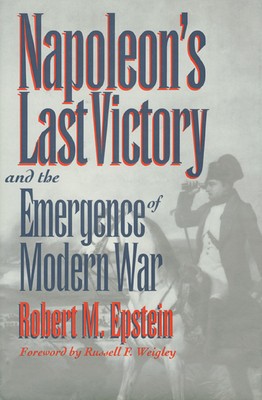
- We will send in 10–14 business days.
- Author: Robert M Epstein
- Publisher: University Press Of Kansas
- ISBN-10: 070060751X
- ISBN-13: 9780700607518
- Format: 15.3 x 22.9 x 1.5 cm, softcover
- Language: English
- SAVE -10% with code: EXTRA
Napoleon's Last Victory and the Emergence of Modern War (e-book) (used book) | bookbook.eu
Reviews
Description
Presenting a significant new interpretation of Napoleonic warfare, Robert M. Epstein argues persuasively that the true origins of modern war can be found in the Franco-Austrian War of 1809.
Epstein contends that the 1809 war--with its massive and evenly matched armies, multiple theaters of operation, new command-and-control schemes, increased firepower, frequent stalemates, and large-scale slaughter--had more in common with the American Civil War and subsequent conflicts than with the decisive Napoleonic campaigns that preceded it. Epstein examines 1809 in terms of the evolving new systems of recruitment, organization, and command used by both sides. As he shows, this was the first time that two states confronted each other on the battlefield with armies created by large-scale conscription, organized in corps, and coordinated along two major theaters of operation (Danubian and Italian). As a result, the opponents were forced into "distributed maneuvers" that produced broad operational fronts in which battles became both sequential and simultaneous, but ultimately indecisive. Ironically, as Epstein points out, neither Napoleon nor the opposing commander Archduke Charles ever fully understood that a paradigm shift had occurred in the conduct of war. Regardless, after 1809, warfare would never be the same.EXTRA 10 % discount with code: EXTRA
The promotion ends in 19d.23:49:57
The discount code is valid when purchasing from 10 €. Discounts do not stack.
- Author: Robert M Epstein
- Publisher: University Press Of Kansas
- ISBN-10: 070060751X
- ISBN-13: 9780700607518
- Format: 15.3 x 22.9 x 1.5 cm, softcover
- Language: English English
Presenting a significant new interpretation of Napoleonic warfare, Robert M. Epstein argues persuasively that the true origins of modern war can be found in the Franco-Austrian War of 1809.
Epstein contends that the 1809 war--with its massive and evenly matched armies, multiple theaters of operation, new command-and-control schemes, increased firepower, frequent stalemates, and large-scale slaughter--had more in common with the American Civil War and subsequent conflicts than with the decisive Napoleonic campaigns that preceded it. Epstein examines 1809 in terms of the evolving new systems of recruitment, organization, and command used by both sides. As he shows, this was the first time that two states confronted each other on the battlefield with armies created by large-scale conscription, organized in corps, and coordinated along two major theaters of operation (Danubian and Italian). As a result, the opponents were forced into "distributed maneuvers" that produced broad operational fronts in which battles became both sequential and simultaneous, but ultimately indecisive. Ironically, as Epstein points out, neither Napoleon nor the opposing commander Archduke Charles ever fully understood that a paradigm shift had occurred in the conduct of war. Regardless, after 1809, warfare would never be the same.

Reviews